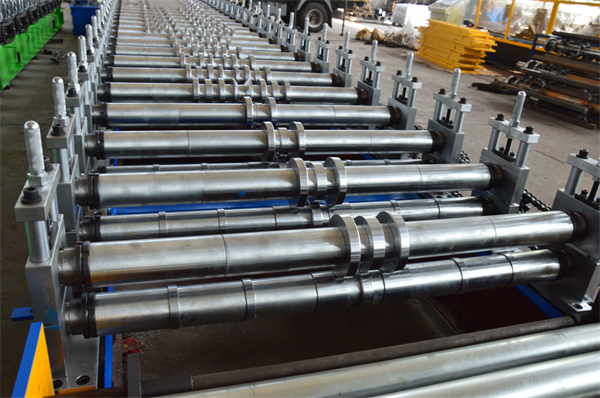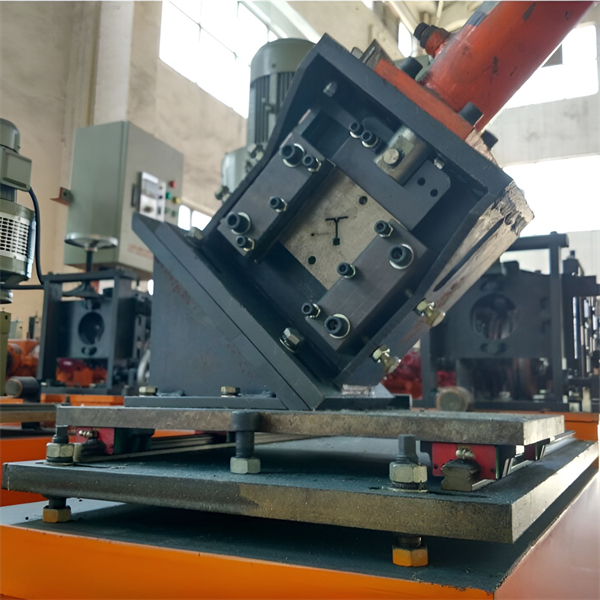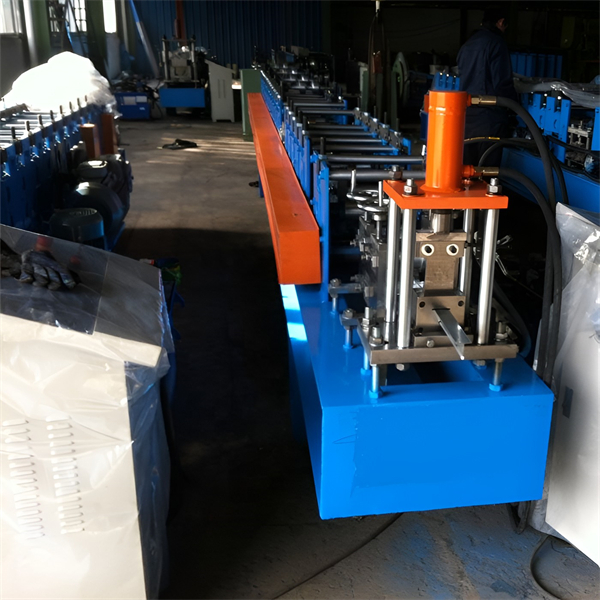1. Introduction
Metal roofing sheets are widely used in the construction industry for their durability, versatility, and aesthetic appeal. These sheets are commonly manufactured using a metal roofing sheet roll forming machine, a specialized piece of equipment designed to produce high-quality metal roof panels efficiently. In this article, we will explore the functionalities, benefits, working principles, types, and considerations when choosing a metal roofing sheet roll forming machine.
2. What is a Metal Roofing Sheet Roll Forming Machine?
A metal roofing sheet roll forming machine is a mechanical device that transforms metal coils into roofing panels with specific profiles and dimensions. It utilizes a continuous process known as roll forming, where a flat metal coil passes through a series of rollers, gradually shaping the metal into the desired form. The machine’s precision and efficiency ensure consistent panel production, making it an essential tool for metal roofing manufacturers.

3. Benefits of Metal Roofing Sheet Roll Forming Machines
3.1 Cost-Effective Production
Metal roofing sheet roll forming machines offer cost-effective production capabilities. They eliminate the need for outsourcing or purchasing pre-formed panels, reducing production costs and increasing profitability. By producing panels in-house, manufacturers can have better control over quality, customization, and delivery timelines.
3.2 Customization Options
One of the significant advantages of metal roofing sheet roll forming machines is the ability to create customized panels. The machine can produce panels of various profiles, shapes, and sizes, allowing manufacturers to cater to specific customer requirements. This flexibility opens up opportunities for architectural creativity and unique roofing designs.
3.3 Efficiency and Speed
Metal roofing sheet roll forming machines are designed for high-speed and efficient production. The continuous roll forming process ensures a rapid transformation of metal coils into finished panels. With automated feeding, cutting, and stacking mechanisms, the machine optimizes production speed, reducing downtime and maximizing output.
3.4 Durability and Longevity
Metal roofing sheets are known for their exceptional durability and longevity, and the roll forming process plays a crucial role in achieving these characteristics. By subjecting the metal to controlled shaping, the machine enhances the structural integrity of the panels, making them resistant to harsh weather conditions, corrosion, and other external factors.
3.5 Versatility
Metal roofing sheet roll forming machines offer versatility in terms of the materials they can handle. They are compatible with various metals such as steel, aluminum, and copper, allowing manufacturers to produce panels with different material properties and appearances. This versatility enables the creation of roof systems suitable for diverse environments and architectural styles.

4. How Does a Metal Roofing Sheet Roll Forming Machine Work?
A metal roofing sheet roll forming machine operates by feeding metal coils into the machine, which are then guided through a series of rollers. These rollers are designed with specific contours and profiles that gradually shape the metal into the desired form. The machine applies consistent pressure, bending the metal to match the shape of the rollers. As the metal passes through each roller, it undergoes continuous transformation until it reaches the final profile. Finally, the machine cuts the panels to the desired lengths and stacks them for further processing or packaging.
5. Types of Metal Roofing Sheet Roll Forming Machines
There are several types of metal roofing sheet roll forming machines available, each designed to cater to specific roofing profiles and requirements. Some common types include:
5.1 Single Layer Roll Forming Machine
The single layer roll forming machine is designed to produce single-layer roofing panels. It is suitable for standard roofing profiles and is commonly used in residential and commercial applications.
5.2 Double Layer Roll Forming Machine
The double layer roll forming machine enables the production of two different profiles simultaneously. It is commonly used in situations where a combination of profiles or colors is required, such as in industrial or institutional buildings.
5.3 Standing Seam Roll Forming Machine
The standing seam roll forming machine specializes in producing standing seam roofing panels. These panels have raised seams that interlock, providing enhanced weather resistance and an aesthetically pleasing appearance.
5.4 Corrugated Sheet Roll Forming Machine
The corrugated sheet roll forming machine is designed to manufacture corrugated roofing panels. These panels have a distinct wavy pattern, offering excellent strength and water shedding capabilities.

6. Factors to Consider When Choosing a Metal Roofing Sheet Roll Forming Machine
When selecting a metal roofing sheet roll forming machine, there are several crucial factors to consider:
6.1 Material Compatibility
Ensure that the machine you choose is compatible with the specific metal materials you plan to work with, such as steel, aluminum, or copper. Different materials may require specific adjustments or additional tooling.
6.2 Production Speed
Evaluate the production speed of the machine and ensure it aligns with your desired output and customer demands. Faster production speeds can increase efficiency and profitability but may come at a higher initial cost.
6.3 Machine Size and Capacity
Consider the available space in your facility and choose a machine size that fits your production requirements. Additionally, evaluate the machine’s capacity to handle the coil width and thickness you plan to work with.
6.4 Automation and Control System
Modern metal roofing sheet roll forming machines often come with advanced automation and control systems. These features enhance productivity, reduce manual labor, and provide precise control over the production process. Assess the level of automation that suits your needs.
6.5 Maintenance and Support
Choose a machine from a reputable manufacturer that offers reliable maintenance and technical support. Regular maintenance and prompt assistance can minimize downtime and ensure smooth operations.

7. Common Applications of Metal Roofing Sheets
Metal roofing sheets find applications in various industries and sectors. Some common uses include:
- Residential roofing
- Commercial and industrial roofing
- Agricultural buildings
- Warehouses and storage facilities
- Educational institutions
- Healthcare facilities
- Sports and recreational buildings
Metal roofing sheets provide excellent protection against weather elements and offer long-lasting performance, making them a preferred choice for many construction projects.

8. Conclusion
Metal roofing sheet roll forming machines are essential tools for manufacturers in the construction industry. With their ability to produce cost-effective, customizable, and durable roofing panels, these machines offer numerous benefits. By understanding the working principles, types, and factors to consider when choosing a machine, manufacturers can make informed decisions that align with their production needs and goals. The versatility of metal roofing sheet roll forming machines allows for the creation of various roofing profiles, catering to different architectural styles and environments.
In conclusion, investing in a high-quality metal roofing sheet roll forming machine can significantly enhance a manufacturer’s capabilities and competitiveness in the market. These machines offer cost-effective production, customization options, efficiency, durability, and versatility. By carefully considering factors such as material compatibility, production speed, machine size, automation, and maintenance support, manufacturers can choose the right machine that suits their specific requirements.
FAQs
- Are metal roofing sheets more expensive than traditional roofing materials?
Metal roofing sheets may have a higher upfront cost compared to traditional roofing materials such as asphalt shingles. However, their long lifespan, durability, and energy efficiency often make them a cost-effective choice in the long run. - Can metal roofing sheets be installed on existing roofs?
In many cases, metal roofing sheets can be installed over existing roofs, depending on the condition of the current roof and the local building codes. It is advisable to consult with a professional roofer to assess the feasibility and requirements of such an installation. - Are metal roofing sheets noisy during rain or hailstorms?
Metal roofing sheets are not significantly noisier than other roofing materials during rain or hailstorms. Proper insulation and attic space can help reduce any noise caused by precipitation. - Do metal roofing sheets require special maintenance?
Metal roofing sheets generally require minimal maintenance. Regular inspections, clearing debris, and ensuring proper drainage are recommended. Additionally, it is important to address any minor damages or repairs promptly to prevent potential issues. - Can metal roofing sheets be recycled?
Yes, metal roofing sheets are highly recyclable. At the end of their lifespan, they can be recycled into new metal products, contributing to sustainability and environmental conservation.
Remember, investing in a metal roofing sheet roll forming machine is a significant decision that can impact your manufacturing processes and product quality. It is advisable to consult with industry experts or suppliers to gain a deeper understanding of the specific requirements and options available in the market. With the right machine and proper implementation, you can efficiently produce high-quality metal roofing sheets that meet the demands of the construction industry.
